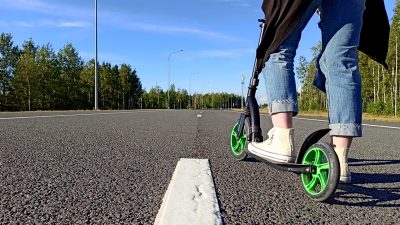
Photo: Woman scooter dreamstime_s_192912988
Ride on: Lessons in closing the micromobility gender gap
05 March 2021
by Sarah Wray
Austrian author, artist and feminist Rosa Mayreder (1858-1938) said that cycling did more for female emancipation than all the efforts of feminists put together. She claimed it allowed women to go out unaccompanied, ditch impractical “billowing” clothing and gain a more active image, bolstering social equality.
Still, statistics have persistently shown a gender imbalance in cycling and scootering, with more men typically wheeling around. This is slowly changing, though, and lessons learned during the pandemic could improve things further, said panellists on a webinar this week presented by the London Women in Mobility (WiM) network and Cities Today, moderated by Olga Anapryenka, a co-founder of the WiM London Hub and a Senior Consultant in New Mobility at Steer.
Research carried out during the pandemic by shared bike and e-scooter operator Beryl found that the gender split of cyclists using its services actually tipped in favour of women at 51 percent.
“That was really exciting for us to see that…and we absolutely do think COVID has had an impact,” said Georgia Yexley, Head of Growth at Beryl and Chair of the Women@Beryl network.
The same study found that 58 percent of those active at the time were returning to cycling after a long break, suggesting that perhaps women were taking advantage of quieter roads to give cycling a go.
Gateway drug
Shared schemes can act as a “gateway drug to picking up more sustainable practices,” Yexley said noting that around a third of those surveyed said they were considering going on to buy a bike.
Research from CoMoUK, an advocacy, research and development charity for integrated mobility, backs this up. A 2019 survey found a bike-share gender split of 58 percent male compared to 40 percent female (averaged over four years of results). This compares to an average 29 percent of general cycle trips being taken by women, according to the 2018 National Travel Survey for England 2018. E-bikes have also been found to boost female participation.
“The way bike-share is set up; it’s an easy way to give it a try. It’s a very low barrier to entry,” said Antonia Roberts, Deputy Chief Executive of CoMoUK.
At TIER Mobility, which offers e-scooters and mopeds in Europe, the gender split is around 70 percent male, but the company has seen increasing numbers of women using mopeds, especially during COVID-19.
Research shows that women are typically more cautious and safety-conscious, which can be a blocker to them taking up cycling and scootering. Once they feel safe, though, they are also more willing to use environmentally friendly transport modes so instilling this confidence is key.
TIER is very focused on safety in its scooter design with sturdy, large wheels, for instance, and has also offered moped and scooter training for women. Nastya Koro, a User Researcher at TIER and Women of TIER member, said this had been very successful and that: “We’re looking to research further into how to adapt our offer to women’s needs.”
She described how a woman who couldn’t cycle due to knee problems signed up for moped training and after was able to use the mopeds on a daily basis.
“It made her life easier and it was very heart-warming to hear that,” Koro commented.
Trusted networks
Yexley said: “I wholeheartedly agree that training and providing access in a controlled environment is really beneficial, knowing that safety considerations play a factor in what might hold women back from accessing the services.”
As well as providing their own training, partnerships are a key way micromobility companies can support more people. Beryl, for instance, partners with various networks including Evolve –The Cycling Network For Muslim Women.
CoMoUK worked on the Bikes For All project in Glasgow which aimed to engage people from disadvantaged and marginalised groups. It also brought in more women.
“There were two things that we really learned from that,” said Roberts. “Engage with these groups through existing trusted networks.
“Also, don’t necessarily call it training – you could just call it a picnic, or an introduction to the city or a social get together. Take the emphasis off any aspects that might seem off-putting.”
Freewheeling
Incentives such as free rides and offers can also encourage women and others to give scooters and bikes a try.
Roberts noted an initiative in Scotland last year where the government funded free bike-share rides in Glasgow and Edinburgh.
“The uptake was amazing,” said Roberts. “It’s just about getting people over that first [hurdle] to try it out. Of course, it’s got to be done alongside really good infrastructure as well.”
Yexley highlighted that at the time of Beryl’s survey which found an uptick in female riders and people returning to cycling, the company had been running a number of free access programmes, particularly for key workers.
It also ran free promotions in Hereford through funding from the Department for Transport.
“The uptake was phenomenal – we saw 100 percent and over growth week on week,” Yexley said. “So we have to absolutely get behind that message of if you lower the barriers to access people will come and they’ll see how it fits into their daily life. And they’ll see how accessible it actually is for them.”
TIER has provided free rides to essential workers during various stages of the pandemic and has seen more cities seeking partnerships to provide first-mile/last-mile solutions, Koro said.
She also urged local authorities to focus on infrastructure through a gender equity lens, citing the example of Vienna which did this from the 90s, widening pavements and upgrading streetlights, for instance.
“In the end they improved the liveability of the whole city,” Koro said.
Other topics discussed on the webinar included routes into and roles in the micromobility industry, business models and more. Replay the session above.
Image: Lorientis| Dreamstime.com






